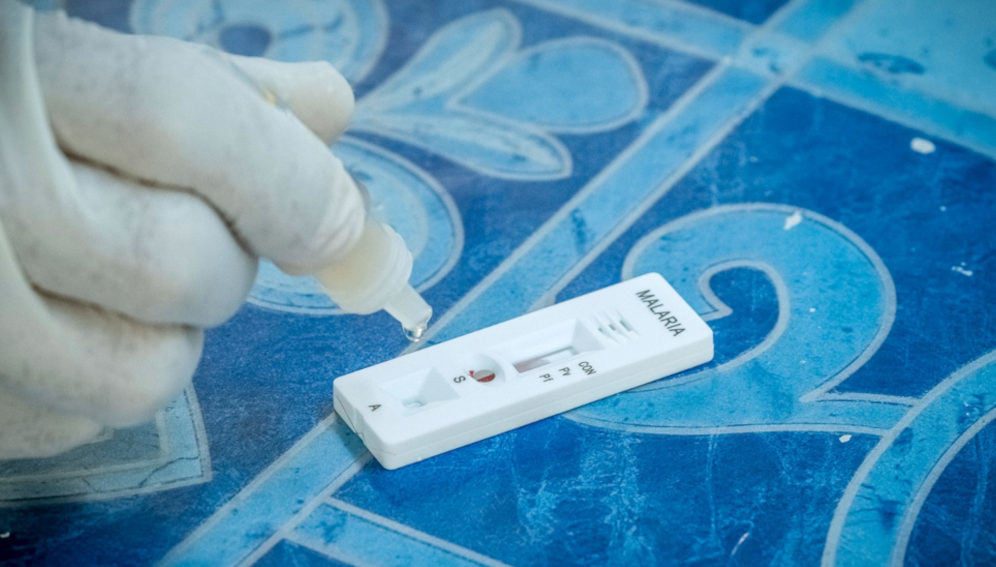14/11/25
Malaria rapid diagnostic test ‘not fit for purpose’

By: Claudia Caruana
Send to a friend
The details you provide on this page will not be used to send unsolicited email, and will not be sold to a 3rd party. See privacy policy.
[NEW YORK, SciDev.Net] An international study published in the Malaria Journal claims that a widely used test for detecting malaria is delivering too many inaccurate false-negative results and is “not fit for purpose”.
The study authors are calling for the removal of the test—the Abbott-Bioline rapid diagnostic test—from the market in Southeast Asia where it is widely deployed and where around 4 million people a year are affected by malaria, according to the World Health Organization (WHO).
Researchers from the Shoklo Malaria Research Unit (SMRU), part of Oxford University’s MORU Tropical Health Network, found that the test correctly identified only 18 per cent of Plasmodium falciparum and 44 per cent of Plasmodium vivax infections—considerably lower rates than other brands of rapid tests.
“Saying, ‘You don’t have malaria’ to someone with falciparum malaria in a very remote area could be a death sentence.”
Nicholas White, professor of tropical medicine
Many of the tests only showed a faint line to identify positive cases, even where the patient was showing signs of fever.
However, other studies from Africa have reported better performance of the same test.
“Malaria is a major cause of illness and an important cause of death where we work,” said study co-author Nicholas White, a professor of tropical medicine at Mahidol University, Bangkok and at the University of Oxford’s Centre for Tropical Medicine and Global Health.
“Saying, ‘You don’t have malaria’ to someone with falciparum malaria in a very remote area could be a death sentence,” he told SciDev.Net.
Rapid diagnostic tests are the mainstay of malaria control, the study stressed, allowing malaria to be treated near home, quickly and efficiently, even in remote areas where laboratory testing is unavailable.
However, the sensitivity of the Abbott-Bioline test was called into question after researchers working with the SMRU in Southeast Asia reported multiple false negatives. The test is made by Abbott Diagnostics, part of the US multinational company Abbott Laboratories.
“Until recent years we were very satisfied with these rapid malaria tests, then we and others started to notice that they were not working so well,” said White. He stressed that he and his colleagues have diagnosed and treated “hundreds of thousands of patients” over a number of decades.
The study was conducted between October 2024 and January 2025, on the Thailand-Myanmar border, where until recent conflict, falciparum malaria was close to elimination.
It compared the performance of the Abbott-Bioline test with another rapid diagnostic test and microscopy tests.
The Abbott-Bioline test, the researchers concluded, “failed to detect microscopically confirmed cases of malaria and is not fit for purpose”.
‘Performing as intended’
A spokesperson for Abbott said the company had conducted a review of the product in response to the complaints, which showed that the tests were “performing as intended”.
She told SciDev.Net: “Abbott also engaged a WHO-qualified lab to conduct additional tests which further confirmed our findings.
“In addition, multiple published studies cite the accuracy and performance of this test.”
She said the company was also looking at whether it can increase the intensity of the test line, to make the positive results clearer.
“Consistent with the product’s label, any line shown designates a positive result and we have communicated this with our customers and providers,” the spokesperson added.
However, Sunday Atobatele, a partner of Sydani Group, a Nigeria-based consultancy firm whose focus includes health and technology, says faint lines increase the risk of misinterpretation or misrecording of test results.
Atobatele was involved in a study covering Nigeria, Uganda and Benin that looked at whether rapid malaria tests were stable enough over time to be used to support disease surveillance.
“Both [studies] demonstrate that limitations in either test performance or recording practices can compromise the accuracy of malaria surveillance data,” he told SciDev.Net.
Sunday said Abbott’s Bioline test and the First Response malaria test, made by India’s Premier Medical Corporation, showed higher rates of results changing over time than other brands. He stressed the importance of training, supervision and validation to ensure results recorded are reliable.
‘Slow response’
White emphasises that the WHO’s role is to guide countries on which tests are good and which are not. But “they have been slow to respond appropriately in this case”, he says.
On the issue of faint lines, he added: “We proved that they were often so faint as to be undetectable.
“Imagine trying to read a rapid test—which is like a COVID-19 test in appearance—in a forest in the monsoon when the light is poor. Faint lines simply cannot be seen. So, the test is reported as ‘negative’ and the malaria sufferer remains untreated.”
François Nosten, director of SMRU and another study author, says thousands of people may be affected by a wrong result.
“It looks like this problem was mostly found in Southeast Asia although this particular test is commercialised all over the tropical world,” he said.
According to the Abbott website, the test is useful in regions where all types of malaria are circulated as it distinguishes P. falciparum infection from others.
WHO’s response
A WHO spokesperson said the organisation had reviewed several reports of Abbott’s Bioline rapid diagnostic tests showing false negatives and faint positive test lines for patients with confirmed malaria infection, since August 2024.
She said the tests are primarily used in Asia and South America where both P. falciparum and P. vivax are endemic.
Reviews of other brands which had also received complaints showed “an upward trend” for faint test lines and false negatives, she added.
Consequently, WHO issued a public notice on 31 March 2025 aimed at ensuring proper test usage and increase reporting of incidents. A further detailed technical note was issued to technical advisers in the relevant regions, the spokesperson said.
She said the WHO had been working with Abbott Diagnostics Korea—the South Korean subsidiary of Abbott Diagnostics which manufactures the tests for the region—to address concerns, including through a site inspection, which did not find cause to delist the product.
“The manufacturer has indicated that new studies are being conducted for cross-reactivity, label comprehension, and results interpretation,” she said, with results expected by December.
“Once WHO receives the additional evidence, it will undergo review and will be assessed against prequalification requirements.”
This piece was produced by SciDev.Net’s Global desk.


